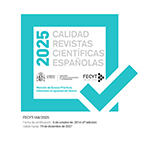Memoria democrática y polarización en el espacio digital. Retos y oportunidades en la escuela
Resumen
Este trabajo propone abordar polarización y desmemoria democrática, de manera conjunta en la escuela, a fin de romper la relación que retroalimenta ambas. La memoria colectiva se reelabora continuamente a través de experiencias grupales y dentro de un contexto, realizándose esta reelaboración cada vez más en los espacios digitales. Con ello se expone a los peligros de las redes entre los que se encuentra la polarización, pues si bien no todos los temas y experiencias que se manifiestan en las redes son proclives a la polarización, la memoria democrática remite a elementos ideológicos, identitarios y afectivos que sí lo son. La polarización debilita los fundamentos de la sociedad democrática, lo que resulta paradigmático y grave cuando se produce en torno a una propuesta que tiene el objetivo contrario: su fortalecimiento. La LOMLOE proporciona un marco desde el que intervenir en el círculo entre desmemoria y polarización. Ello permite identificar cuatro ejes a partir de los cuales diseñar situaciones de aprendizaje que impliquen distintas materias y múltiples competencias que al mismo tiempo que favorezcan el reconocimiento de la lucha por la democracia, favorezcan la convivencia en ella.
Descargas
Descarga artículo
Licencia
La revista Política y Sociedad, para fomentar el intercambio global del conocimiento, facilita el acceso sin restricciones a sus contenidos desde el momento de su publicación en la presente edición electrónica, y por eso es una revista de acceso abierto. Los originales publicados en esta revista son propiedad de la Universidad Complutense de Madrid y es obligatorio citar su procedencia en cualquier reproducción total o parcial. Todos los contenidos se distribuyen bajo una licencia de uso y distribución Creative Commons Reconocimiento 4.0 (CC BY 4.0). Esta circunstancia ha de hacerse constar expresamente de esta forma cuando sea necesario. Puede consultar la versión informativa y el texto legal de la licencia.











